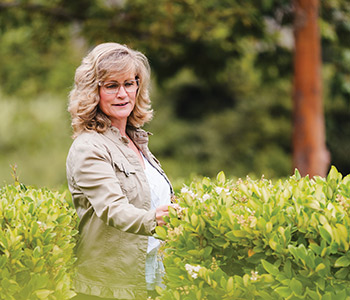Beating lung cancer at the genetic root

“Once I got to UCI Health, I felt like I was on a bullet train of hope,” says Michelle Helm of the lung cancer experts who gave her a second chance at life. Photos by Michael Der
Michelle Helm’s lung cancer journey began as a frustrating, frightening ride through multiple misdiagnoses. Then she found UCI Health specialists who wouldn’t accept the worst-case scenario other doctors had painted for her.
Today, the Mission Viejo parenting coach says she is thriving because she was referred to the lung cancer specialists at the UCI Health Chao Family Comprehensive Cancer Center, where she benefited from their arsenal of advanced therapies and surgical expertise.
“Before I got to UCI Health, I was feeling lost and frustrated,” says Helm. “Nobody was listening to me. I felt that nobody was on my team.”
Lung cancer is the leading cause of U.S. cancer death for men and women, and it is too often detected at an advanced stage. “It’s not the most common cancer, but it’s the deadliest,” says Dr. Ali Mahtabifard, director of thoracic surgery at UCI Health and a member of the lung cancer team.
Helm’s odyssey began in April 2021 when she found herself coughing and struggling for breath, her heart beating wildly within a few hours of eating conch — a shellfish delicacy — on a Florida vacation. After returning home, her cardiologist sent her to a lung specialist. The steroid inhalers he prescribed for what he diagnosed as asthma made it harder to breathe and triggered a yeast infection in her throat, making her cough even worse.
With the COVID-19 pandemic still raging, it took almost four months to see another doctor for a second opinion. A CT scan revealed abnormal white lines in the upper lobe of one lung. The new pulmonologist suggested a bronchoscopy to investigate further.
Afraid it was cancer, Helm wanted a more definitive test and asked for a lung biopsy. The surgeon who performed the biopsy told her the lung tissue looked odd, “very spongy.” At daughter Tanna Bettendorf's urging, she asked that a sample be sent for genetic testing and specifically for a gene called BRAFV600E. Bettendorf, a chemist, had recently helped develop a promising drug to target the BRAFV600E gene, which has been linked to many types of cancer.
Six months to live
In early August, she met with a community hospital oncologist who reviewed the biopsy results. “I walk in, he sits me down and tells me I have terminal lung cancer, that surgery isn’t an option and that I have, at best, six months to live.”
Helm’s daughter asked him about the genetic test results. He said her records didn’t show any indication of a genetic mutation. Stunned, they went home and gathered the family together to share the devastating news.
An hour later, the phone rang. It was the oncologist, who said he’d made a mistake, that he'd found the genetic testing results, which showed her cancer did have the BRAFV600E mutation. He told her he didn’t know how to treat her cancer but vowed to refer her to the best oncologists.
Helm was stunned. “It was like I’d been punched in the gut.”
Three days later, she met with UCI Heath medical oncologists, including nationally recognized experts in complex lung conditions. They brought in Mahtabifard, who serves as director of thoracic surgery at UCI Health.
After reviewing her case records and newly ordered lung scans, the doctors proposed a treatment plan. If they could kill the cancerous tissue in her right lung with targeted therapy, she could then undergo surgery, which would improve her chances for long-term survival.
As home to the only National Cancer Institute-designated comprehensive cancer center based in Orange County, UCI Health cancer specialists are able to offer alternatives such as clinical trials and targeted therapies when the standard of care is exhausted, which is why doctors throughout the region often send their most challenging cases to the cancer center.
Team Michelle
Finally, Helm was confident that she had a medical team in her corner. “Once I got to UCI Health, I felt like I was on a bullet train of hope,” she says. “I didn’t have to wait for anything. They knew if they didn’t move quickly, I would die.”
Genetic mutations are common in lung cancers, especially among nonsmoking patients like Helm. Identifying which one is essential because several game-changing therapies have been developed to target specific mutations. Because they use the most advanced genetic tests available, the UCI Health oncologists say they are able to identify mutations other institutions may have missed.
Helm's stage III cancer was advanced but localized. The oncologists started her on an oral medication designed to target primary lung cancers with certain genetic mutations. Three months later, there was no sign of active tumor growth. It was time for surgery.
On Dec. 8, 2021, Mahtabifard removed the top third of Helm’s right lung. It was a difficult surgery, he recalls, complicated by scar tissue from the earlier biopsy operation as well as residual tumor tissue that had turned the consistency of concrete.
Thoracic surgeries have grown exponentially at UCI Health since Mahtabifard was recruited in 2018 to head the program. Before his arrival, the health system averaged 14 lung surgeries annually. Today, he and fellow thoracic surgeon Dr. Hari B. Keshava perform close to 300 a year. A third surgeon is expected to join the team this year.
Next, Helm underwent four weeks of radiation in early 2022. She continued taking oral medication targeting gene mutations like hers to protect against recurrence. Recent scans found no sign of cancer activity.
Not just one cancer
Lung cancer is not just one cancer, There are different types with different mutations and survival depends on finding a treatment targeting the specific mutation.
This approach is often called precision medicine because it targets the biological underpinnings of the specific gene mutation that spurs cancer growth.
The FDA has approved therapies for at least 10 different lung cancer mutations. If a patient has one of those mutations, "we can give you targeted therapy pills instead of chemotherapy,” says one UCI Health lung specialist.
Lung cancer may still be the No. 1 cause of cancer deaths, but the prognosis for patients is “changing before our eyes,” says Mahtabifard, who recalls not being able to do much for patients with advanced lung cancer when he was undergoing fellowship training in thoracic surgery less than 20 years ago.
“These immunotherapies are allowing many patients with advanced stage disease to live long and fulfilling lives.”
A second chance
Reflecting on her winding path from an unfortunate shellfish dinner to a terminal diagnosis to recovery, Helm, now 57, is grateful for the expert care she received.
She still arrives for every visit and procedure wearing the sequined ruby red slippers she received in a care package from a friend whose Red Slipper Warrior Project supports women and girls fighting cancer. She even awoke from her lung surgery to find them still on her feet in the recovery room.
Today Helm feels healthy and her prognosis is good. She continues to work as a parent educator and stays active, riding her electric bike — named Spicy Red Dog Warrior — to the beach and zipping up and down the hills of Mission Viejo.
She is also getting in shape for the upcoming UCI Anti-Cancer Challenge on Oct. 7, the cancer center’s seventh annual bicycle ride, run and walk to raise awareness and funds for critical cancer research. The community-based event at UCI’s Aldrich Park will feature 5K and 10k runs and walks, and bicycle rides of 14- to 100-mile distances. For the first time, there will also be a mountain bike trail ride.
“I love that the money all goes to research at the cancer center,” Helm says. “If it wasn’t for UCI Health, I would be dead.”
Helm recently had a conch shell tattooed on her ankle, a reminder that her lung cancer might not have been found in time if not for her reaction to eating the shellfish. She also makes it a practice to give other women cancer warriors a pair of red slippers as encouragement to “stay strong and fight this horrible disease,” she says.
“I got a second chance at life. I do have a miracle story.”
Learn more about the UCI Anti-Cancer Challenge or register at anti-cancerchallenge.org ›
Related stories
- 'TeamNeush' mobilizes to fight a young woman's bile-duct cancer ›
- Riding tall a decade after prostate surgery ›
- Survivor beats breast cancer not once but twice ›
- Clinical trial gives gastric cancer patient new lease on life ›
Explore further
Browse more blog posts by topic.






